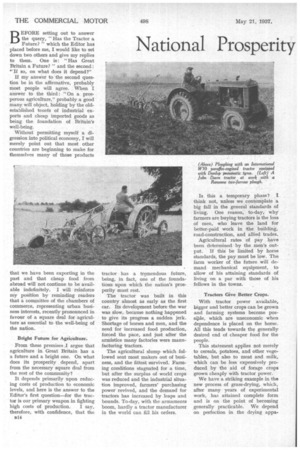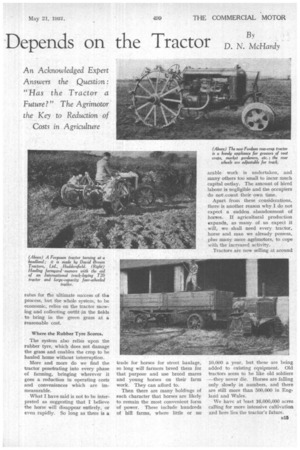National Prosperity
Page 48

Page 49

If you've noticed an error in this article please click here to report it so we can fix it.
Depends on the Tractor D. N. BM' cHardy BEFORE setting out to answer the query, "Has the Tractor a Future?" which the Editor has placed before me, I would like to set down two others and give my replies to them. One is : "Has Great Britain a Future? " and the second: "If so, on what does it depend?"
If my answer to the second question be in the affirmative, probably most people will agree. When I answer to the third: " On a prosperous agriculture," probably a good many will object, holding by the oldestablished tenets of industrial exports and cheap imported goods as being the foundation of Britain's well-being. .
Without permitting myself a digression into political economy, I will merely point out that most other countries are beginning to make for themselves many of those products that we have been exporting in the past and that cheap food from abroad will not continue to be available indefinitely. I will reinforce my position by reminding readers that a committee of the chambers of commerce, representing urban business interests, recently pronounced in favour of a square deal for agriculture as essential to the well-being of the nation.
Bright Future for Agriculture.
From these premises I argue that agriculture in Great Britain has a a future and a bright one. On what does its prosperity depend, apart from the necessary square deal from the rest of the community?
It depends primarily upon reducing costs of production to economic levels, and here is the answer to the Editor's first question—for the la-actor is our primary weapon in fighting
high costs of production. I say, therefore, with confidence, that the tractor has a tremendous future, being, in fact, one of the foundations upon which the nation's prosperity must rest.
The tractor was built in this country almost as early as the first car. Its development before the war was slow, because nothing happened to give its progress a sudden jerk. Shortage of horses and men, and the need for increased food production, forced the pace, and just after the armistice many factories were manufacturing tractors.
The agricultural slump which followed sent most makers out of business, and the fittest survived. Farming conditions stagnated for a time, but after the surplus of world crops was reduced and the industrial situation improved, farmers' purchasing power revived, and the demand for tractors has increased by Imps and bounds. To-day, with the armaments boom, hardly a tractor manufacturer in the world can fill his orders. Is this a temporary phase? I think not, unless we contemplate a big fall in the general standards of living. One reason, to-day, why farmers are buying tractors is the loss of men, who leave the land for better-paid work in the building, road-construction, and allied trades.
Agricultural rates of pay have been determined by the men's output. if this be limited by horse standards, the pay must be low. The farm worker of the future will demand mechanical equipment, to allow of his attaining standards of living on a par with those of his fellows in the towns.
Tractors Give Better Crops.
With tractor power available, bigger and better crops can be grown and farming systems become possipIe, which are uneconomic when dependence is placed on the horse. All this tends towards the generally desired end of cheaper food for the people.
This statement applies not merely to cereals, potatoes, and other vegetables, but also to meat and milk, which can be less expensively produced by the aid of forage crops grown cheaply with tractor power.
We have a striking example in the new process of grass-drying, which, after many years of experimental work, has attained complete form and is on the point of becoming generally practicable. We depend on perfection in the drying appa ratus for the ultimate success of the process, but the whole system, to be economic; relics on the tractor mowing and collecting outfit in the fields to bring in the green grass at a reasonable cost.
Where the Rubber Tyre Scores.
The system also relies upon the rubber tyre, which does not damage the grass and enables the crop to be hauled home without interruption.
More and more do we find the tractor penetrating into every phase of farming, bringing wherever it goes a reduction in operating costs and conveniences which are immeasurable.
What I have said is not to be interpreted as suggesting that I believe the horse will disappear entirely, or even rapidly. So long as there is a trade for horses for street haulage, so long will farmers breed them for that purpose and use brood mares and young horses on their farm work. They can aflord to.
Then there are many holdings of such character that horses are likely to remain the most convenient form of power. These include hundreds of hill farms, where little or no arable work is undertaken, and many others too small to incur much capital outlay. The amount of hired labour is negligible and the occupiers do not‘count their own time.
Apart from these considerations, there is another reason why I do not expect a sudden abandonment of horses. If agricultural production expands, as many of us expect it will, we shall need every tractor, horse and man we already possess, plus many more agrimotors, to cope with the increased activity.
Tractors are now selling at around 10,000 a year, but these are being added to existing equipment. Old tractors seem to be like old soldiers • --they never die. Horses are falling only slowly in numbers, and there are still more than 500,000 in England and Wales.
We have at least 10,000,000 acres calling for more intensive cultivation and here lies the tractor's future.




































































































